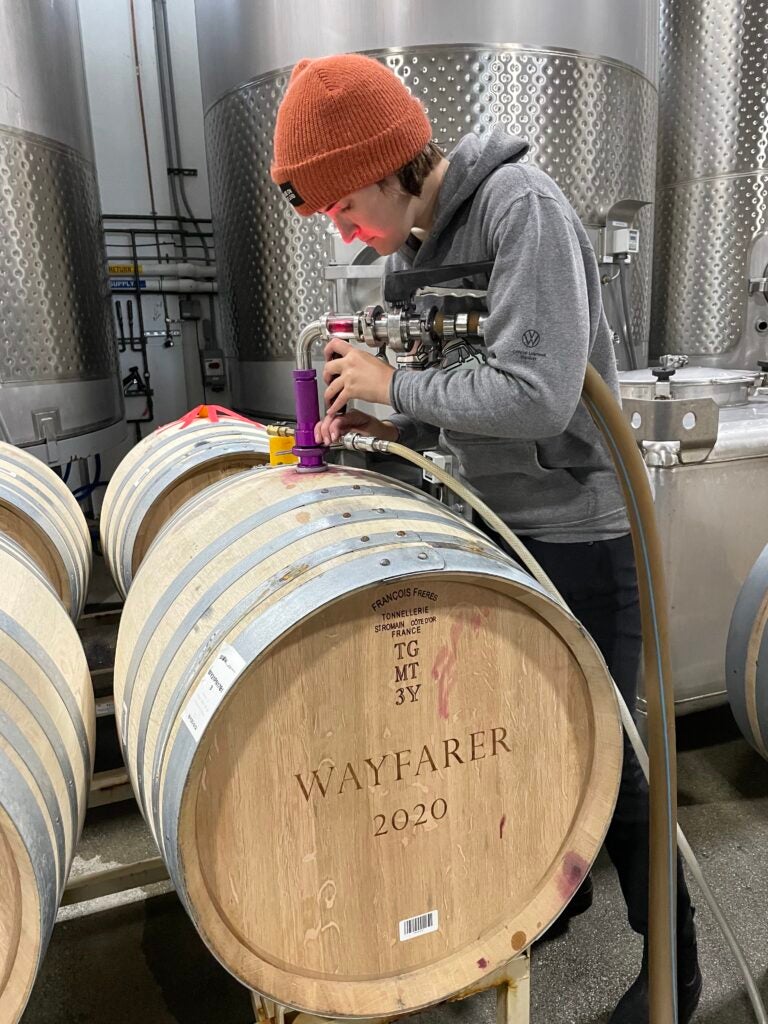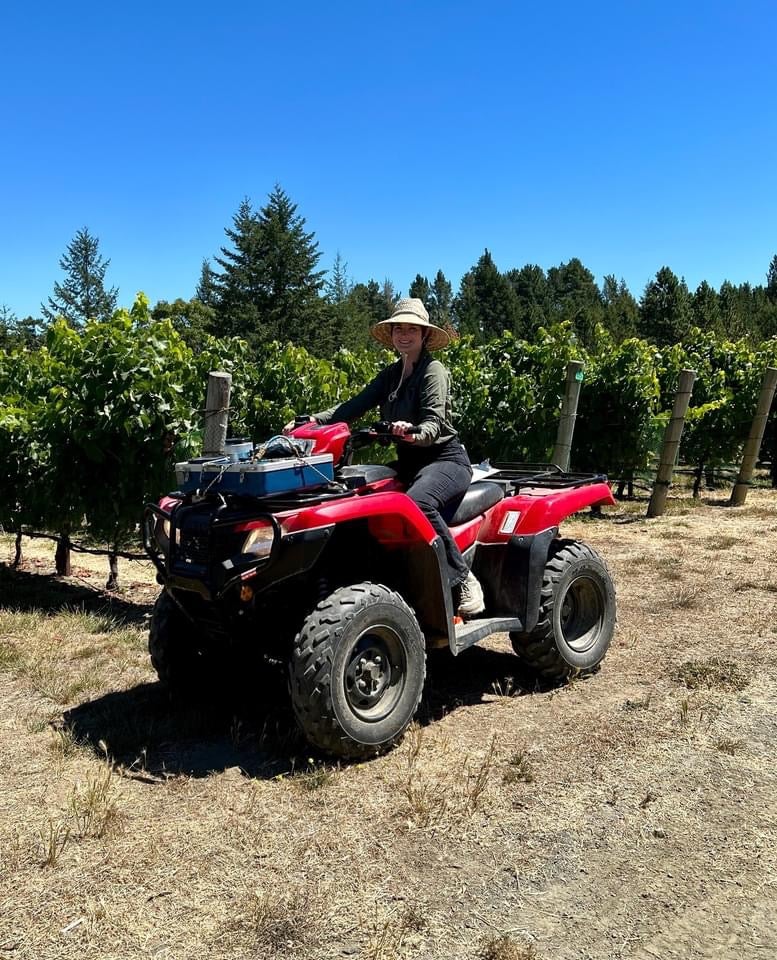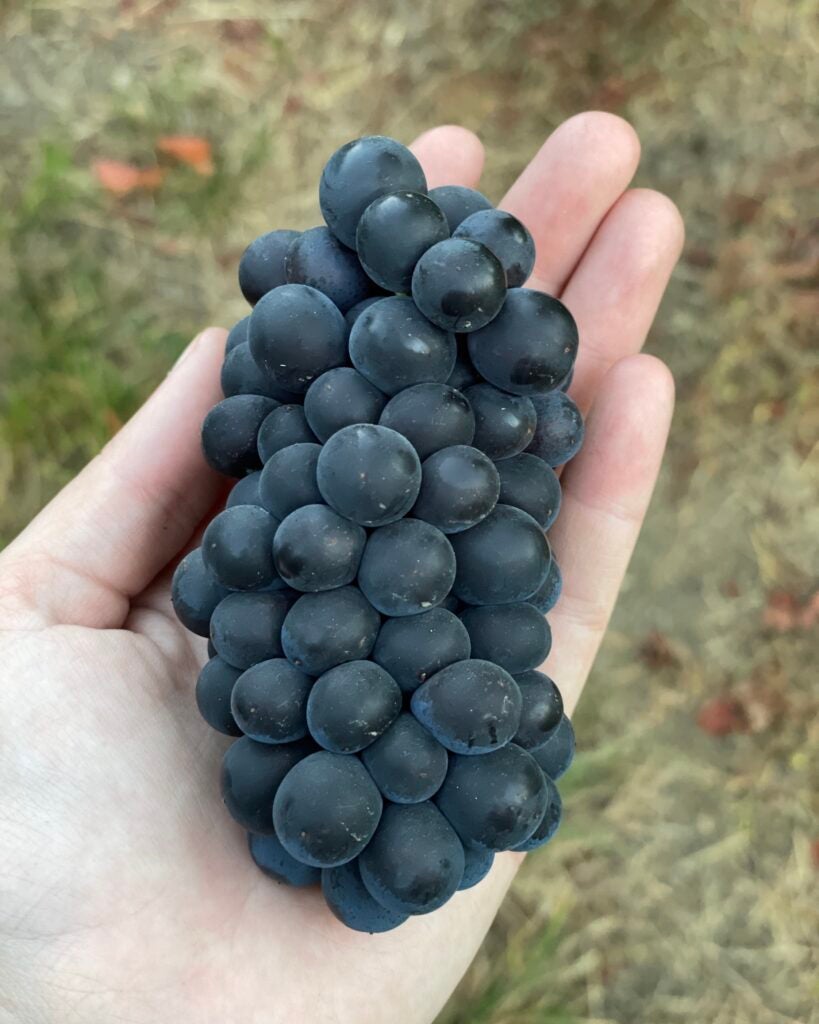Modern problems call for modern solutions.
Some of these solutions would not be possible without researchers and agronomy professionals like Cosette Taggart striving to make changes in modern agriculture.

“The thing that I like the most about agronomy is that it takes a holistic approach to crop production,” Taggart said. “It makes you look at the environment as a whole and not just the pieces. Because at the end of the day, that’s how our world works.
“It’s not just the organisms living in the soil or the climate or the rain or the composition of the soil. It’s all of those things working together in unison which create our losses and our wins in the field. Being able to research those pieces and bring them together for a solution, I think is really rewarding work to do.”
Taggart, a Tarleton State Master’s in Agriculture and Natural Resources alumnus, is a Production Assistant for Wayfarer Vineyards in Sonoma County, CA. Her role at the vineyard is two-fold. Her role involves tracking the phenology of the vines, water needs through stem water potential, preparing and coordinating the fall harvest, and overseeing the organic pest and nutrient management plan each year. Additionally, Taggart assists in the wine cellar and lab, running all analyses on fermenting and finished wines.
“It has been really interesting to see a product from field to bottle and how our practices in the vineyard affect the wine itself,” Taggart said. “I’m continuing to learn all the time and that keeps the job fun and interesting.”
Following graduation with a biochemistry degree from American University in Washington, D.C., in 2016, Taggart worked as a Research Technician in Dr. Mala Mahendroo’s lab at UT Southwestern. Her work there focused on the biology of cervical remodeling in term and preterm birth.
“It was a really great professional experience,” Taggart said. “[I realized] I wanted something different than being stuck inside all day. I loved the natural world, and I still really loved research, so I knew my next step was graduate school.”
This realization led Taggart to Tarleton State in the fall of 2019. She took on the thesis track soon after under the direction of Dr. James Muir. Taggart’s thesis research focused on the determination of appropriate biochar levels for implementation in production agriculture and future field-scale trials.
“I believe that if we want to continue using land year after year and adapt to what consumers want and the plants need, we will need to look to our agricultural past and innovate it for the future.”
Biochar is a carbon-rich material made from organic waste, such as wood chips or manure, that resembles charcoal. Taggart’s research with Muir led to an impressive publication record for the young alumnus, which are linked at the conclusion of the article.
“The demand on the soil of our modern agriculture is not sustainable…and consumers of the products are less and less happy to see synthetic nutrients being used to bolster ‘spent soil,’” Taggart said. “I believe that if we want to continue using land year after year and adapt to what consumers want and the plants need, we will need to look to our agricultural past and innovate it for the future – I think biochar will definitely have a role to play in that.”
Taggart’s past and present will soon collide as Wayfarer Vineyard begins implementing biochar – sourced from their prunings – into their production practice. The vineyard’s mission to seek continuous improvement has given Taggart the freedom to make suggestions and implement new ideas.
“If someone told me 10 years ago, I would be working in a vineyard, I would have probably laughed,” Taggart said. “But I love it. So, really, [my] end all be all goal is to enjoy the ride and enjoy life.”
The pieces of Taggart’s young career have worked together to present her success found in the industry. These experiences have provided a unique wisdom that she offers to other young people searching for success.
“Chase your interest and find what makes you excited about work,” Taggart said. “Apply for the job that you might not be qualified for, you never know where taking a chance can take you. Find a good mentor. They have experiences and wisdom that you do not have and are able to support you along the way.”


See the articles below to read more on research in which Taggart contributed.
Brady, J.A., C.B. Taggart, C. Leija, K. Sefcik, L.J. Entio, E. Kan, J.P. Muir. 2025. Warm-season plant interactions and dairy manure biochar alter soil microbial communities and soil functional capacity. Frontiers in Microbiology. (in composition).
Choi, G., J. Brady, O. Obayomi, E. Green, C. Leija, K. Sefcik, D. Gonzalez, C.B. Taggart, J.P. Muir, and E. Kan. 2024. Wood-and manure-derived biochars reduce antibiotic residues and shift microbial communities in manure applied forage-soil systems. Agronomy. 14(9), 2100. https://doi.org/10.3390/agronomy14092100
Entio, L., Taggart, C. B., J. P. Muir, E. Kan, J. A. Brady, O. Obayomi. 2024. Biochar and dairy manure amendment effects on Cynodon dactylon performance and soil properties. Plants. 2816774. doi:10.3390/plants13020242
Entio, L., Taggart, C. B., J. P. Muir, E. Kan, J. A. Brady, O. Obayomi. 2024. Dairy effluent-saturated biochar short-term effects on Vigna unguiculata and Cynodon dactylon performance and soil properties. Plants 13(6), 851. 2866573. Doi:10.3390/plants13060851
Taggart, C. B., J. P. Muir, J. A. Brady, E. Kan, A. B. Mitchell, and O. Obayomi. 2023. Impacts of biochar on Trifolium incarnatum and Lolium multiflorum: soil nutrient retention and loss in amended sandy loam. Agronomy. 13, 26. https://doi.org/10.3390/agronomy13010026
Obayomi, O.A., C. Taggart, S. Zeng, K. Sefcik, B. Willis, J.P. Muir, E. Kan, and J.A. Brady, 2023. Dairy manure-derived biochar in soil enhances nutrient metabolism and soil fertility, altering the soil prokaryote community. Agronomy. 13(6), 10.3390. https://doi.org/10.3390/agronomy13061512